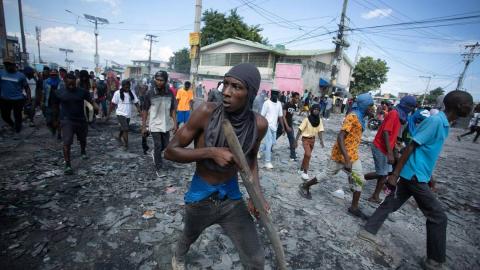UN Seeks a Humanitarian Corridor in Haiti

UN seeks a ‘humanitarian corridor’ in Haiti in areas where gangs continue to block fuel
BY JACQUELINE CHARLES
Miami Herald
UPDATED OCTOBER 06, 2022
For the second time in less than a year, Doctors Without Borders/Médecins Sans Frontière, the French humanitarian medical organization has announced its temporary shutting down an emergency medical center because of gang violence in Haiti. With gangs continuing to block the entrance to Haiti’s seaports and the country’s main fuel terminal, the United Nations and its partners are asking for the opening of a “humanitarian corridor” to allow the release of fuel and aid workers to move freely without fear for their safety to respond to the worsening crisis.
The appeal comes amid a resurgence of cholera, which risks infecting and killing thousands of people as Haitians increasingly find themselves without access to clean water because of an ongoing blockade of fuel by a powerful gang coalition, the G-9 federation, now in its fourth week. The appeal joins a similar call for “a humanitarian truce” launched earlier this week by Canada’s ambassador to Haiti, Sébastien Carrière, on behalf of more than a dozen ambassadors and special representatives assigned to Port-au-Prince.
On Thursday morning, the population in the southwestern city of Les Cayes attacked a U.N. facility belonging to UNICEF, the U.N.’s leading child-welfare agency. The looting played out live on Facebook. Late Wednesday, in an address to Haitians, interim Prime Minister Ariel Henry requested international help to get fuel flowing again from the Varreux Terminal and roads cleared so that aid can get to those in need. Though he was not specific about what that aid should look like, it’s been interpreted as foreign military intervention to assist the Haitian police, who have been unable to take back control from the gang.
“The United Nations and the humanitarian community in Haiti are deeply concerned about the serious consequences of the blocking of the Varreux Terminal on the humanitarian situation, in particular the resurgence of cholera,” the United Nations said in a statement. Over the past weeks, health centers have closed and more are on the verge of closing in the coming days as their fuel reserves run out. Water treatment services by the National Directorate of Drinking Water and Sanitation of Haiti have been interrupted, as well as those at private water production and distribution companies. “Access to potable water, sanitation and health care is severely disrupted, which is essential to prevent and respond quickly to cholera,” the U.N. said. Thank you for supporting local journalism Your subscription allows us to provide our readers with quality, relevant journalism that makes a difference. \
Following last year’s deadly earthquake in the south of Haiti, gangs in the Martissant area, just south of Port-au-Prince, temporarily allowed safe passage by aid groups wanting to take assistance to those affected by the disaster. Last November, the G9 gang federation also agreed to allow fuel distribution to resume after nearly a month of blocking trucks from reaching the Varreux terminal. Then, like now, gang leader Jimmy Cherizier, known as “Barbecue,” said he launched the blockade to force the resignation of Henry. The most recent report from Haiti’s health ministry, obtained by the Miami Herald, say it is investigating 111 suspected cases of cholera.
The largest numbers are in Cité Soleil, the expansive slum where the first case was reported this week, and Port-au-Prince. Earlier in the week, a Haitian government official told the Herald that they had confirmed at least eight deaths, two of them in a medical facility. Spread by a bacteria in food and water, cholera causes vomiting and diarrhea and can lead to death if the infected person isn’t promptly treated with an oral solution to restore lost fluids. The key to preventing the illness is hand washing with soap and clean water, along with access to potable drinking water.
UNICEF says it has positioned thousands of water purification tablets, soap bars and drums of chlorine in the capital, but it needs a way to safely deliver them, and fuel for its vehicles. “Cholera can easily spread like wildfire throughout Haiti if people continue to have no or limited access to basic health, water and hygiene services due to insecurity,” said Bruno Maes, the UNICEF representative in Haiti. “To reduce the risks of a major outbreak, our most urgent concern is not only to buy and deliver safe water, chlorine and soap, but to find ways to reach the poorest families in the areas controlled by the gangs.” The waterborne disease threatens the well-being and health of 1.2 million children in Port-au-Prince, UNICEF warned.
With fuel flows blocked, 17 of the 22 major medical facilities throughout Haiti are at risk of closing due to lack of fuel, and 50,000 children and newborns may not receive medical care in the coming weeks, while as many as 7,000 victims of sexual violence could be left untreated by the end of the year, the agency highlighted. Additionally, three quarters of major hospitals across Haiti are failing to provide regular services due to the fuel crisis, the increase in violence and looting. Of particular concern in the cholera upsurge is the precarious conditions in the 36 spontaneous camps in the Port-au-Prince metropolitan area that are home to more than 21,000 people displaced by recent gang violence. “In some areas, access to basic services such as treated water, hygiene and sanitation is virtually cut off, reinforcing the conditions conducive to the spread of cholera,” the U.N. said.
Jacqueline Charles has reported on Haiti and the English-speaking Caribbean for the Miami Herald for over a decade. A Pulitzer Prize finalist for her coverage of the 2010 Haiti earthquake, she was awarded a 2018 Maria Moors Cabot Prize — the most prestigious award for coverage of the Americas.
Photo Credit: Miami Herald
Add new comment